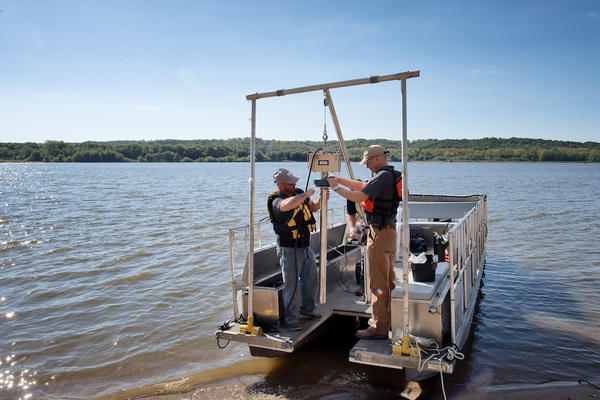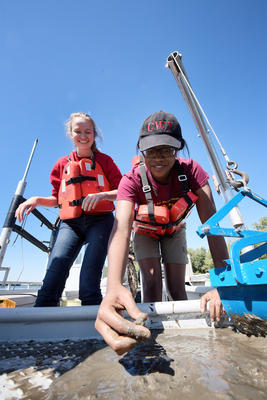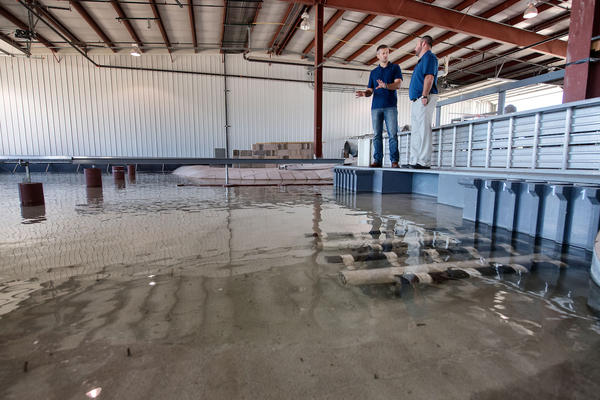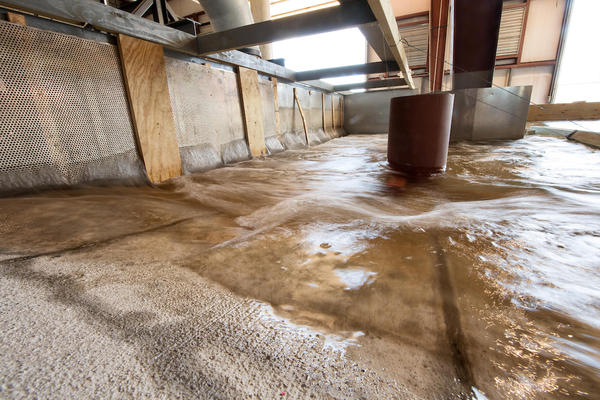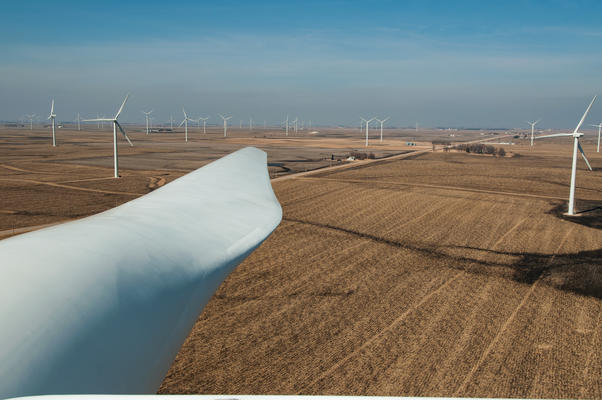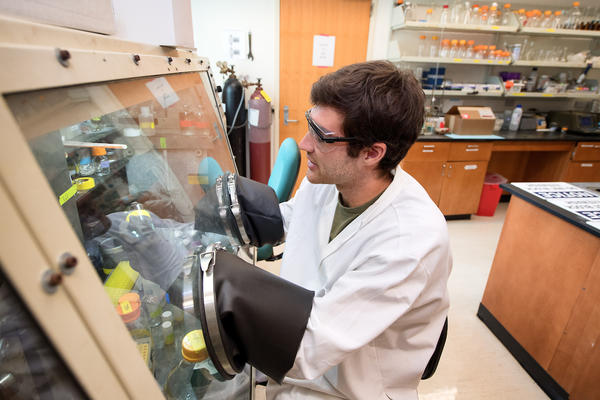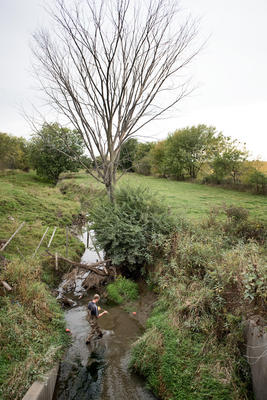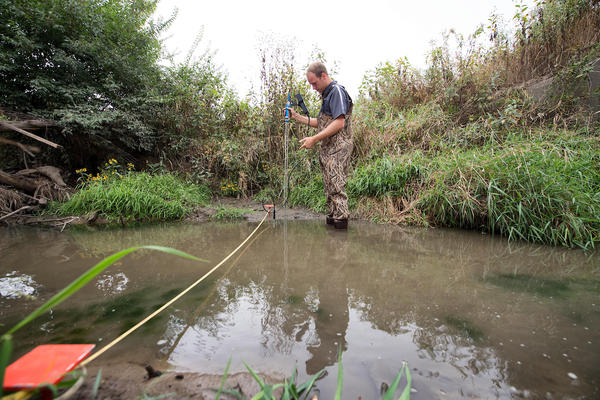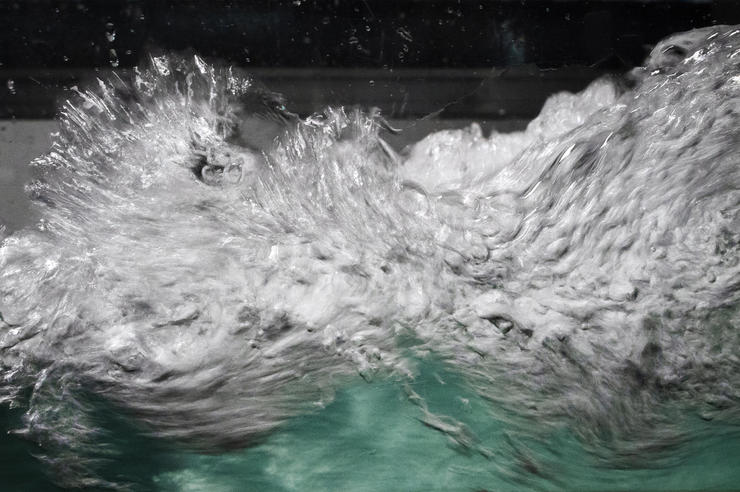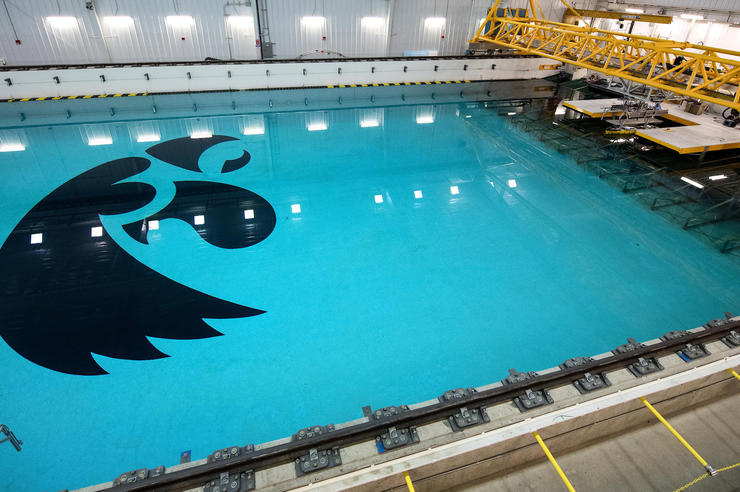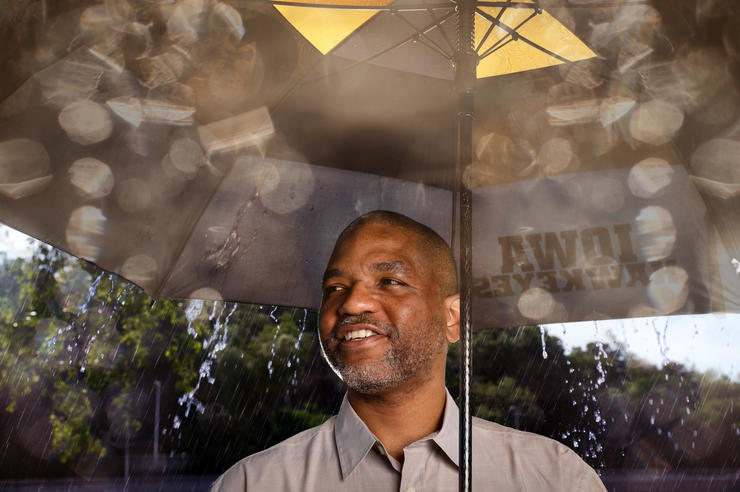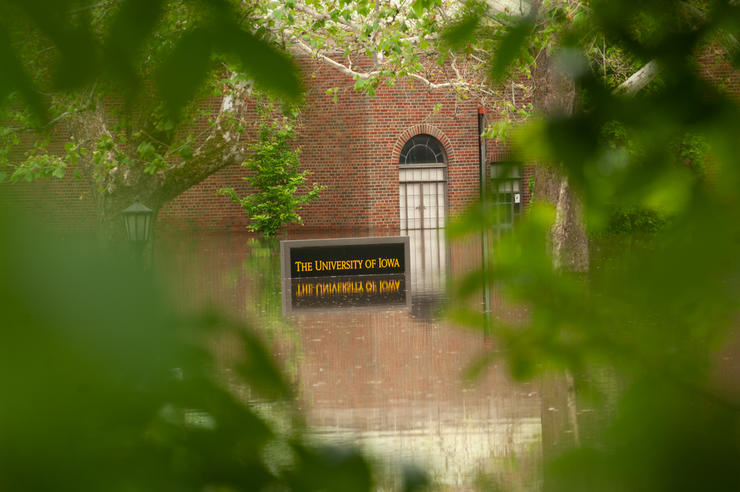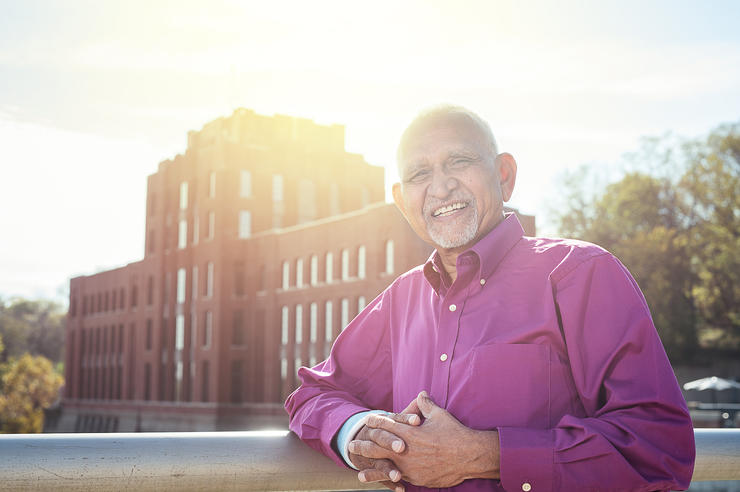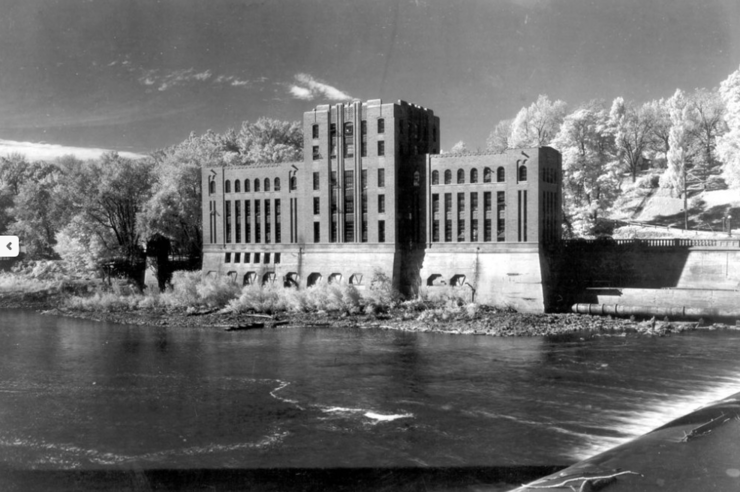Iowa prepares the next generation of sustainability leaders
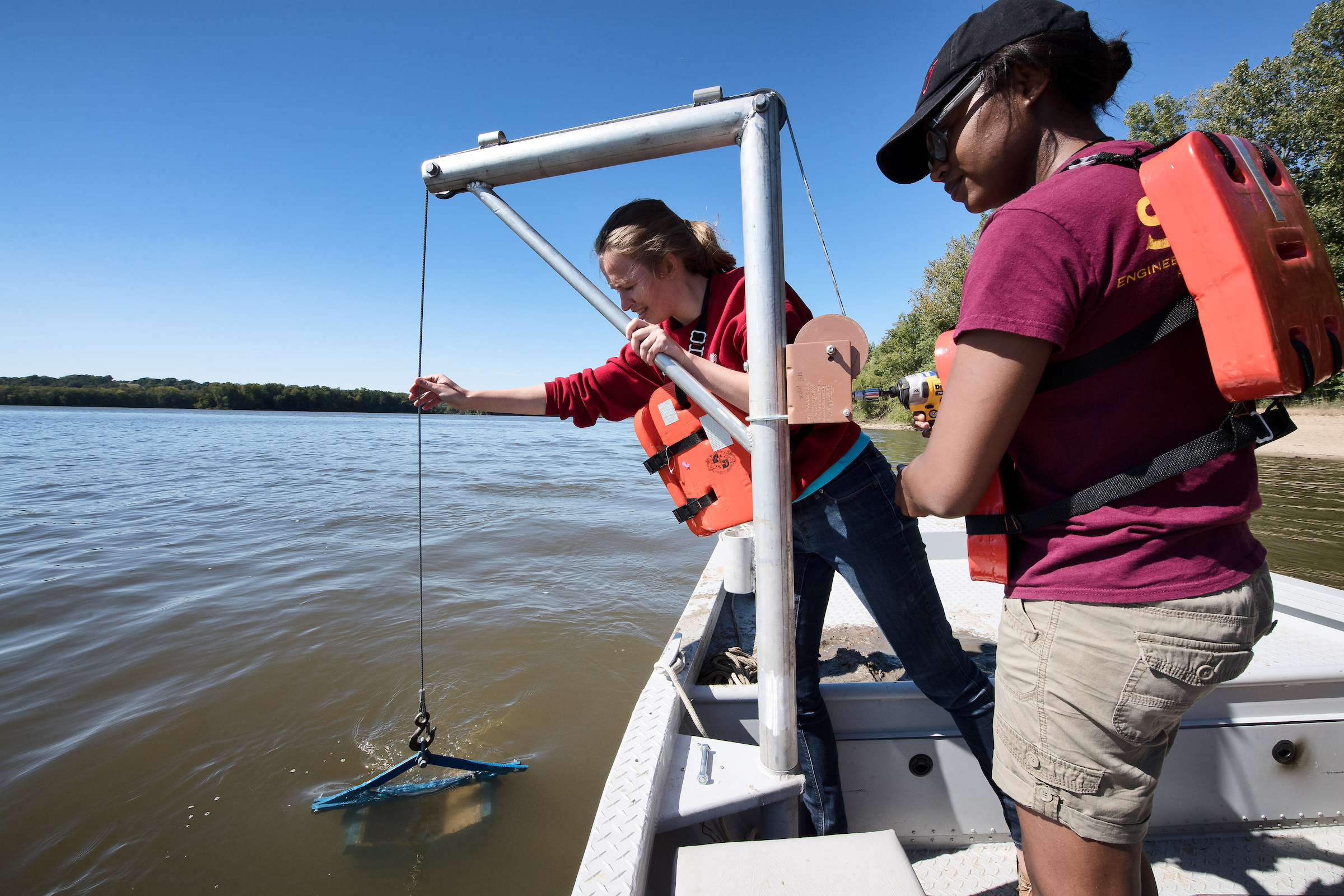
When Amina Grant decided to attend graduate school, she bypassed traditional PhD programs and came to the University of Iowa to participate in a radically different educational experience, one that challenges students to use science and engineering to solve the world’s most pressing water and sustainability problems.
“At this point, the research that I am doing at the University of Iowa just keeps branching out and growing in new and interesting directions,” says Grant, who is from Piscataway, New Jersey, and has a bachelor’s degree in engineering from Pennsylvania State University. “A technical education is important, but I also want to learn about economics, communication skills, and grant writing. When I’m finished here, I want to go out there and get things done.”
“When you think of Iowa, with its vast acres of corn and other crops, the state really does feed the world. Iowa is also a leader in wind energy and is dealing with important water quality issues. This makes the state the perfect place for a training program for professionals who want to address water, food, and energy issues.”
Unlike most graduate programs, the UI’s Sustainable Water Development graduate program doesn’t just prepare students for a career in research and teaching. Rather, it gives them the training they need to become multifaceted professionals, people with the expertise to perform scientific research and the skills to make science understandable, relatable, and believable to a wide audience of community members, elected officials, and policy makers.
This blend of intense scientific learning and research with coursework in social issues, public health, entrepreneurship, and innovation is the main reason the program was awarded a five-year, $3 million grant from the National Science Foundation Research Traineeship (NRT) in 2016. Competition for the grant was intense, but the UI’s geographic nexus of food, energy, and water especially intrigued the reviewers.
“When you think of Iowa, with its vast acres of corn and other crops, the state really does feed the world,” says David Cwiertny, program director and UI associate professor. “Iowa is also a leader in wind energy and is dealing with important water quality issues. This makes the state the perfect place for a training program for professionals who want to address water, food, and energy issues.”
As an institution, the UI also offers a demonstrated commitment to food-, energy-, and water- sustainability research. It is home to IIHR–Hydroscience & Engineering, a world-renowned research institute that specializes in fluid mechanics and hydraulic engineering, as well as the Iowa Flood Center, which is in the process of executing a multiyear, $96.9 million federal grant to improve flood resilience and water quality across the state. There’s also the Iowa Initiative for Sustainable Communities, which links local communities with university resources, including faculty and students, to solve social, economic, and environmental challenges.
“There’s nothing else like Iowa’s Sustainable Water Development graduate program,” says Jerald L. Schnoor, a professor of civil and environmental engineering who has been active in developing sustainability research during his long tenure at the university. “We see this as a great way to build on Iowa’s strength in water-related research, and to recruit young people with new ideas and creativity to the sustainability field.”
Students, or “trainees” as they are called, receive full tuition scholarships as well as an annual living stipend. They also have many options when it comes to charting their educational path, including course electives in engineering, business, education, policy, law, public health, geography, ecology, social work, and informatics. The program is designed to prepare students for academic and non-academic careers, allowing them to choose from a variety of possible professions, including engineer, consultant, entrepreneur, researcher, and professor.
“The program represents a new paradigm in graduate research training, rooted in experiential and service learning, and emphasizing professional-development skills that will promote graduate student placement in a wide range of careers after completion of their degree,” says Cwiertny. “The subject matter—development of sustainable food, energy, and water resources—is also highly innovative, representing a new area of educational focus at UI that also aligns with current national priorities in resource development.”
For the 17 members of the first class, the opportunity to take part in an educational experiment of sorts was exciting. They say that being part of a program that is trying new classroom and fieldwork models, requiring participants to do research in underserved communities and leaving lots of questions open to discussion, is not only refreshing but also liberating—making them feel open to new professional options and challenges.
“The fact that the program is still in its first year and that professors want to tailor it to our needs, not theirs, is something that intrigued me from the start,” says Rachel Smoak, who came to Iowa after completing a dual bachelor’s degree in chemistry and chemical engineering at the University of South Carolina. “The vision for change, in terms of educating a new generation of sustainability leaders and shaking up traditional graduate-level education, was compelling for me.”
“I’m excited to think that when I’m finished here, I won’t just be an engineer—I’ll be a scientist, a budget expert, and a public health expert. I’ll definitely be better prepared for whatever the world throws at me.”
Another draw, they say, was the opportunity to work side by side with environmental and sustainability experts with well-established national and international reputations in research and discovery.
Thomas Robinson waited a year after finishing an undergraduate degree in chemical and environmental studies at Grinnell College just so he could join Iowa’s sustainability program. He says he was sold on the program after speaking with Michelle Scherer, professor and departmental executive officer of civil and environmental engineering, who has a track record of cracking geochemical riddles. Today, Robinson spends several hours a week in the lab with Scherer testing the use of mackinawite, a natural iron-sulfide mineral, to clean up soil contaminated with trichloroethylene, a toxic substance often used in industrial solvents.
“So much of what is attractive about the UI’s Sustainable Water Development program is the people: my cohort and my professors. Everyone is just outstanding,” Robinson says.
The trainees hail from all across the country and around the world, and all are passionate about their research topic. Matthew Meulemans, from Appleton, Wisconsin, graduated from Upper Iowa University in Fayette, Iowa, with a dual degree in conservation management and environmental science. Now at the UI, he measures nitrate levels in Iowa streams to try to pinpoint the source of farm runoff.
“The dead zone in the Gulf of Mexico is the biggest ever,” says Meulemans, the grandson of farmers who wants to earn a master’s degree and become a water-quality researcher. “Farmers should know what they need to do to reduce nitrate runoff. I want to be the sort of scientist who can work with them to find solutions. You can do a lot when you have citizen scientists involved.”
Members of the first class of the Sustainable Water Development program say they are glad they’re getting their education at Iowa.
“I’m so glad I picked the University of Iowa,” says Grant, who had never been to the Midwest before enrolling in the graduate program. “I don’t regret my decision at all. In fact, I’m excited to think that when I’m finished here, I won’t just be an engineer—I’ll be a scientist, a budget expert, and a public health expert. I’ll definitely be better prepared for whatever the world throws at me.”
Learn more about hydroscience at the University of Iowa.
